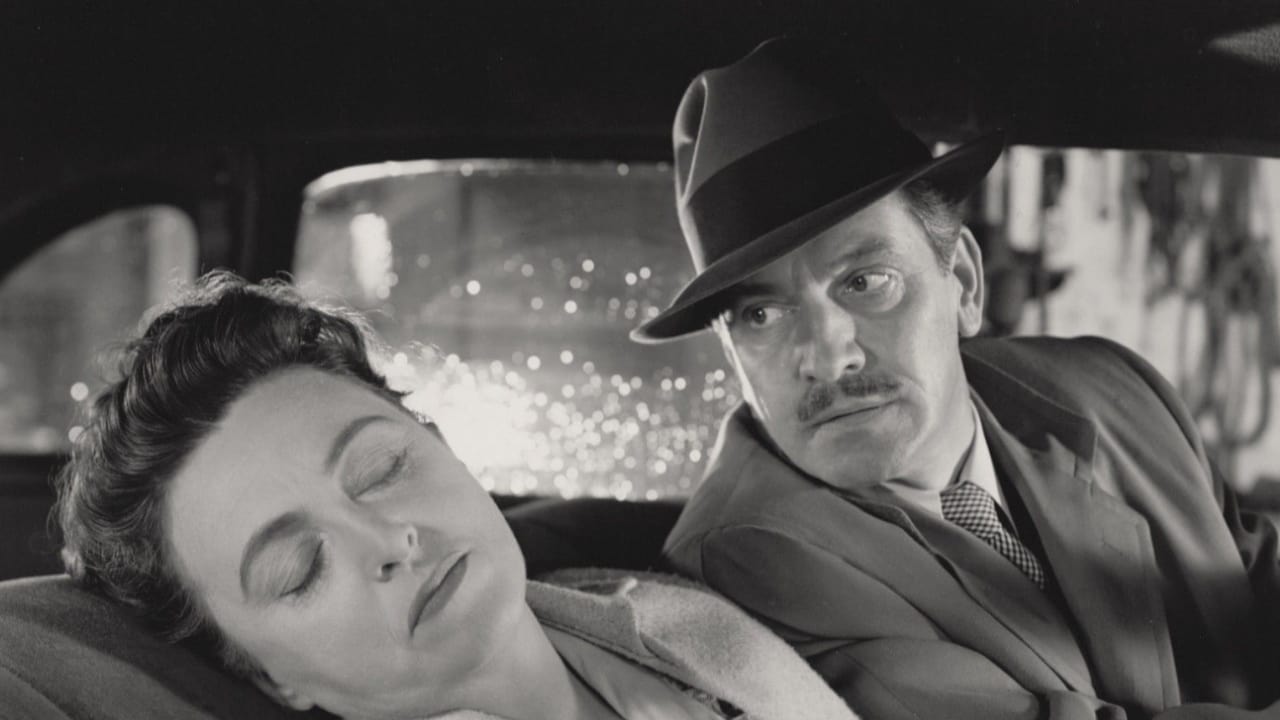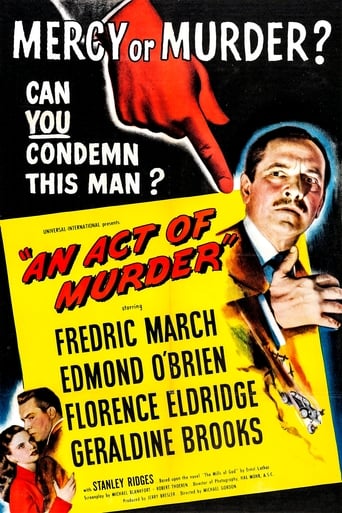Platicsco
Good story, Not enough for a whole film
Phonearl
Good start, but then it gets ruined
Tedfoldol
everything you have heard about this movie is true.
Hayleigh Joseph
This is ultimately a movie about the very bad things that can happen when we don't address our unease, when we just try to brush it off, whether that's to fit in or to preserve our self-image.
blanche-2
Note: Today I went to hospice and said goodbye to a member of my family who has a brain tumor. So this movie resonated.Frederic March, Florence Eldredge, Geraldine Brooks, and Edmond O'Brien star in "Act of Murder," a 1948 film directed by Michael Gordon.March and Eldredge play a happily married couple, Judge Calvin and Catherine Cooke. They have a daughter (Brooks) engaged to an attorney (O'Brien) whose views are not the same as the Judge's.Catherine is suffering from severe headaches, so she sees a doctor. It turns out she is terminally ill. Apparently the practice in those days, in movies anyway, is not to tell the sick person that he or she is terminal. He does inform her husband.Catherine believes there is nothing wrong with her. The Judge decides to take her on a trip, a second honeymoon, during which she becomes violently ill and in intractable pain. When Calvin sees a wounded dog shot on a sidewalk so it wouldn't suffer, the wheels start turning.This is a story about euthanasia, a topic still hotly discussed today. Here is a man who loved his wife desperately, to the point where her pain was his as well. There's a story in Dirk Bogarde's biography about the horrible death his companion suffered; at one point, when he and another turned him during the night, his companion said, "If I were a dog, you wouldn't do this to me." It made Bogarde a proponent of euthanasia."Act of Murder" is a beautifully made movie, heart-wrenching and powerful, nominated for the Grand Prize at Cannes in 1948. The camera work by Hal Mohr is exceptional. As Catherine's and Calvin's world becomes darker and darker, we see it.Frederic March and his wife, Florence Eldredge are absolutely fantastic. They were the original stars on Broadway of Long Day's Journey into Night, and they must have been wonderful. An interesting play, like Streetcar, the focus can shift from the man to the woman, depending on the director and actors.See March and Eldredge in this film.
kapelusznik18
***SPOILERS*** One of if not the first film out of Hollywood that tackles the subject of mercy killings that has honorable and straight laced, in going by the book, Judge Calvin Cooker, Fredic March,come to realize that there are extenuating circumstances in cases that he presides on that is not explained in the law that he's sworn to upholds. This comes crashing down on his head when his wife Catherine, Florence Eldridge, is diagnosed with a fatal brain disease that will slowly end her life, with her brain turning into mush, in excoriating pain. It's later in the movie when the Judge can't take it, his wife's suffering, anymore that in a fit of madness drives his car with his wife Catherine in it off the road where she ends up dead and him suffering severe head shoulder & leg injuries!Even though exonerated in Catherine's dead Judge Cook feels that he in fact murdered her and wants to pay for his crime even if it meant life imprisonment or worse. Having attorney David "Double D" Douglas, Edmond O'Brien, given the job to defend Judge Cook , who refused to defend himself, it's decided the only defense for his action is an insanity defense in that he wasn't in his right mind at the time of the crime that he's not only accused of but admitted to! It takes a lot of work on "Bouble D's" part to not only convince the judge & jury but himself as well to Judge Cook's innocence. In that the man, Judge Cook, was out of his mind at the time of his wife's death but it wasn't him that killed her! It turned out that Catherine herself was the one who did herself in before her husband Judge Cook had the chance to do it!***SPOILERS*** It was Catherine who found out the truth of her fatal illness in going through her husbands papers and knowing what she's in store for, a slow and painful death, that she decided to put herself, in taking a bottle of powerful pain killers, out of her misery. In an autopsy preformed on her on the insistence of Judge Cook's attorney David "Double D" Douglas reviled that Catherine was in fact dead before the car that her husband drove off the road hit the bottom of the gully that it landed in! The ending of the film was a bit of a cop-out in having Judge Cook not going through with his planned mercy killing of his terminally ill wife. But with the movie released in 1948 him really going through with it and being found innocent was totally unthinkable at the time by the movie going public.In fact there was an even more poignant moment in the film a bit earlier when a man's best friend, his dog, was hit by a car and was, as his owner was in tears, mercifully shot and killed by a policeman at the scene. It was that tragic incident that gave Judge Cook the idea to do the same thing, in a car crash, to his wife to keep her from going through the same kind of suffering that the fatally injured canine was going through!
theowinthrop
This is like the forgotten good film in Fredric March's career. People talk about ANTHONY ADVERSE, DR. JECKYLL AND MR. HYDE, THE BEST YEARS OF OUR LIVES, INHERIT THE WIND, or THE ADVENTURES OF MARK TWAIN, but AN ACT OF MURDER is rarely recalled because of it's odd story. At a time when American film audiences wanted to forget World War II and the death and destruction it entailed, March and his wife Florence Eldrich appeared in the only film where their roles were equally important where the subject was euthanasia. It was well told, with March as Judge Cooke, a fiercely strict jurist who rarely showed a drop of mercy towards a convicted defendant. He finds his beloved wife is dying of an incurable, and slowly debilitating disease. While she slowly declines (and very visibly shows her own suffering) the Judge grimly determines to kill her by a convenient car accident. But after the accident the Judge confesses, and faces conviction in his own courthouse. Only at the last moment is he saved from the unforgiving penal code he is always upholding.It is well acted (Edmond O'Brien giving good support as a liberal-minded attorney who is romancing March and Eldrich's daughter). But the best part is watching the chemistry between March and Eldrich. Only their joint appearances in ANOTHER PART OF THE FOREST and INHERIT THE WIND come close to this, but Eldrich's parts in those films is not as essential as her role in this one. And the subject matter is rarely tackled (certainly not in the 1930s or 1940s). If the end is a bit of a cop-out (the trial reveals that March is not guilty) it still is a brave subject to have tackled at all.
Lou Rugani
This film's relentless plotline marches straight-ahead forward as you squirm, fascinated, in your chair. The story is the familiar one about the onset of terminal illness within a solid American family of the 1940s. Never mind that it delves into MGM-style sermonizing; the great real-life husband/wife team of Fredric March and Florence Eldridge portray the couple whose once-comfortable lives are now being separated by an unstoppable and fast-advancing disease. The helpless husband, the uncomplaining wife, and their final attempt to recapture happier days with a doomed weekend outing is the stuff of deep film drama indeed. The sense of onrushing darkness is tangible through the film-noir camera shadings of Hal Mohr (Captain Blood, Phantom of the Opera [1943], The Climax), and Daniele Amfitheatrof's rich musical score. "An Act of Murder" makes a profound statement on the value, and the fragility, of life.

